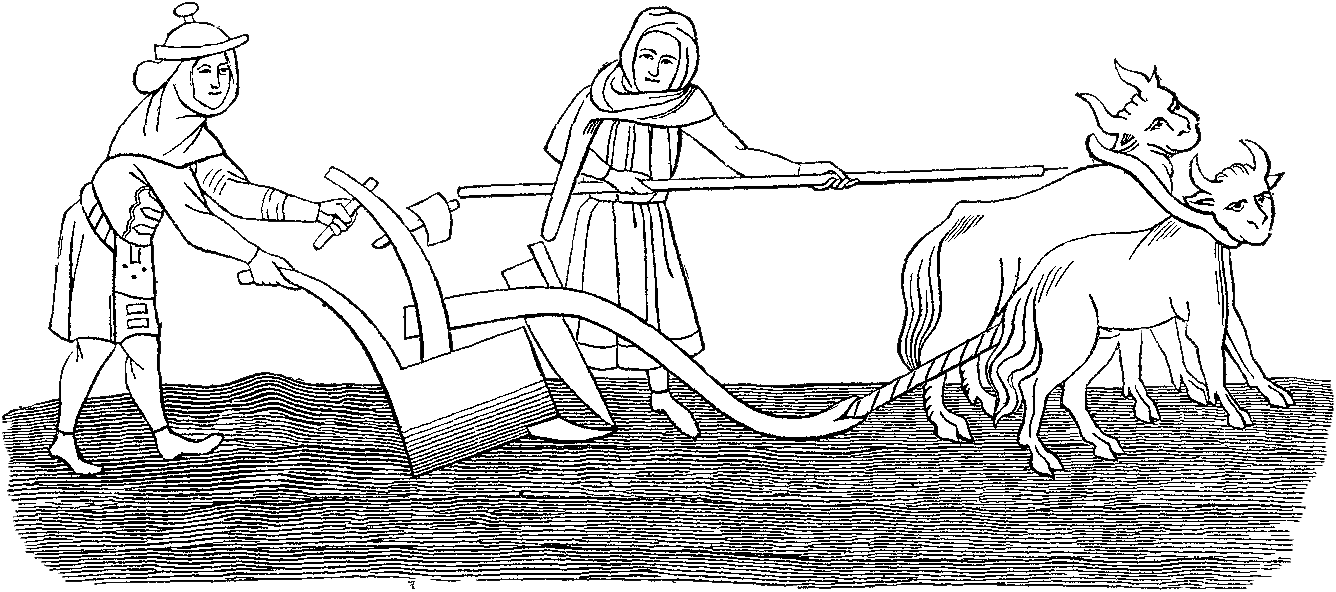The Domesday Book

Above: 'God speed the plough, and send us kome enow.'
Paul Lacroix derivative work: — the Man in Question (in question) [Public domain], via Wikimedia Commons
Paul Lacroix derivative work: — the Man in Question (in question) [Public domain], via Wikimedia Commons
The valuation survey which resulted in the Domesday Book probably started around 1086 and involved most of England. ‘There was no single hide
nor a yard of land, nor indeed ... one ox nor one cow nor one pig which
was there left out, and not put down in his [ie William's] record’.
Anglo-Saxon Chronicle, ed., D. Whitelock, pp.161-62, quoted on http://www.nationalarchives.gov.uk/domesday/discover-domesday/making-of-domesday.htm - Accessed 16-11-2015
It is Britain's earliest public record - the scale of it was not matched until the censuses of the 19th century.
The questions for Cambridgeshire seem to be representative of those used elsewhere:
What is the manor called? Who held it in the time of King Edward (1066)? Who holds it now (1086)?
How many hides are there? How many freemen, sokemen (a type of freeman), villans, cottagers, slaves?
How much woodland, meadow, pasture, mills, fisheries is there?
How much has been added to or taken away from the manor?
How much was the whole worth in 1066, and how much now?
How much has each freeman or sokeman?
Ibid
It was called Domesday by 1180, and may be a reference to Doomsday, or the Biblical day of judgement - neither allowed any appeal.
Ibid
Anglo-Saxon Chronicle, ed., D. Whitelock, pp.161-62, quoted on http://www.nationalarchives.gov.uk/domesday/discover-domesday/making-of-domesday.htm - Accessed 16-11-2015
It is Britain's earliest public record - the scale of it was not matched until the censuses of the 19th century.
The questions for Cambridgeshire seem to be representative of those used elsewhere:
What is the manor called? Who held it in the time of King Edward (1066)? Who holds it now (1086)?
How many hides are there? How many freemen, sokemen (a type of freeman), villans, cottagers, slaves?
How much woodland, meadow, pasture, mills, fisheries is there?
How much has been added to or taken away from the manor?
How much was the whole worth in 1066, and how much now?
How much has each freeman or sokeman?
Ibid
It was called Domesday by 1180, and may be a reference to Doomsday, or the Biblical day of judgement - neither allowed any appeal.
Ibid
1086 The entry for Essebretone (Ashburton) in the Great Domesday Book can be downloaded from the National Archives.
National archives Ref. E 31/2/1/3792
The Domesday Book for Devon is also available as a 2 volume book, edited by Caroline and Frank Thorn, Phillimore, Chichester, 1985.
In 1086 Ashburton had 60 households, and the tax assessed was 6 geld units. There were 34 villagers, 16 smallholders and 10 slaves*. There was land for 20 ploughs, 3 acres of meadow and 1 league each of pasture and woodland. Livestock comprised of 1 cob (ie a horse), 5 cattle and 76 sheep. The lord and the tenant-in-chief was the Bishop of St Peter, Exeter, and the value had been ₤8, but was now ₤20.
http://opendomesday.org/place/SX7679/ashburton - Accessed 13-11-2015
* Only the heads of households were counted.
http://www.domesdaybook.co.uk/life.html - Accessed 15-11-2015
Identifying Ashburton has been difficult in the past, because of a confusion with another manor called Aisbertona. Statements such as the one below, that Ashburton belonged to the king, rather than the Bishop of Exeter, probably arise from this confusion. '[Ashburton] is very ancient, for in doomsday book we find it mentioned under the title of terra regis, or king's lands, being at that time and for many years after a part of the royal demesnes.*'
The Complete English Traveller, Nathaniel Spencer, London 1772, p24
* Demesne - similar to domain.
See H J Hanham's article on the subject, Transactions of the Devonshire Association XCIV, Exeter, 1962, pp 440-457
http://www.timeteign.org.uk/images/local_history/Ashburton_borough/Ashburton_Lordship_of_Manor_Borough.pdf - Accessed 12-1-2016
The Bishop of Exeter at this time was Osbern, who had come over to England from Normandy during the reign of Edward the Confessor.
The Domesday Book for Devon, ed Caroline and Frank Thorn, Phillimore, Chichester, 1985, part 2, 1-2.
Other lands held by the Bishop of Exeter were: Crediton, Newton St Cyres, Bury, Bishopsteignton, Dawlish, Ide, Staverton, St Marychurch, Haxton, Benton, (Bishop's) Tawton, Culmstock, Stoke (Canon), Sidbury, Salcombe, Brightston, Paignton, (Bishop's) Nympton and Branscombe. There were in addition other places which people held 'from the Bishop'.
The Domesday Book for Devon, edited by Caroline and Frank Thorn, Phillimore, Chichester, 1985, 101c,d
Meaning of terms:
Geld. A land tax assessed on the number of hides - a hide was roughly 120 acres, the amount of land that could support a household.
Villager. The class of peasant with most land.
Smallholder. The middle class of peasant. They usually had more than a cottager but less than a villager.
Slave. A man or women unable to move house or work, or to buy or sell, without permission.
Plough(land). The taxable amount of land that can be ploughed by a team of 8 oxen.
League. About one and a half miles.
Tenant-in-chief. Held land directly from the king.
http://www.domesdaybook.co.uk/glossary.html#h - Accessed 15-11-2015
http://www.nationalarchives.gov.uk/domesday/glossary - Accessed 15-11-2-15

Above: Image of the Essebretone Domesday entry. With
many thanks to Anna Powell-Smith, Professor John Palmer and George
Slater of http://opendomesday.org